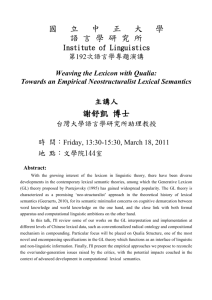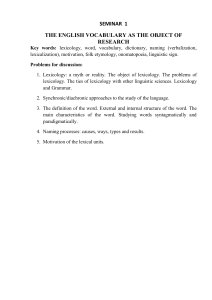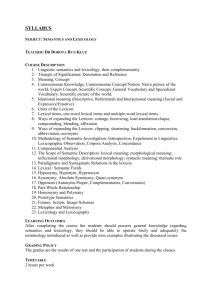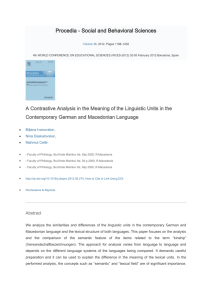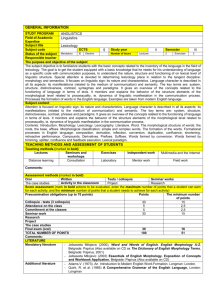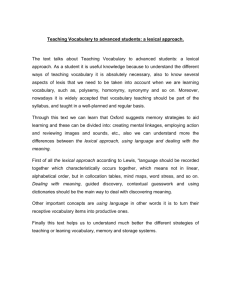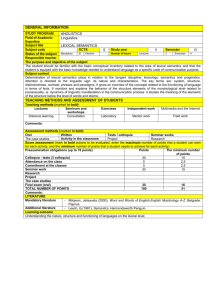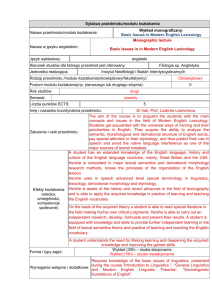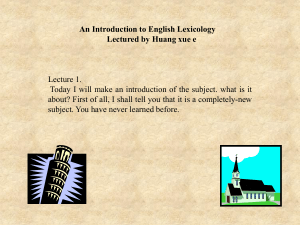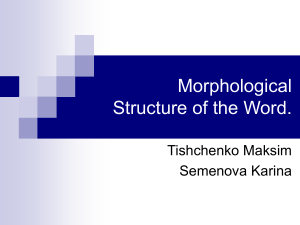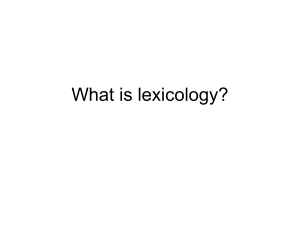Lexicology - Spring 2004 - topics - IS MU
advertisement
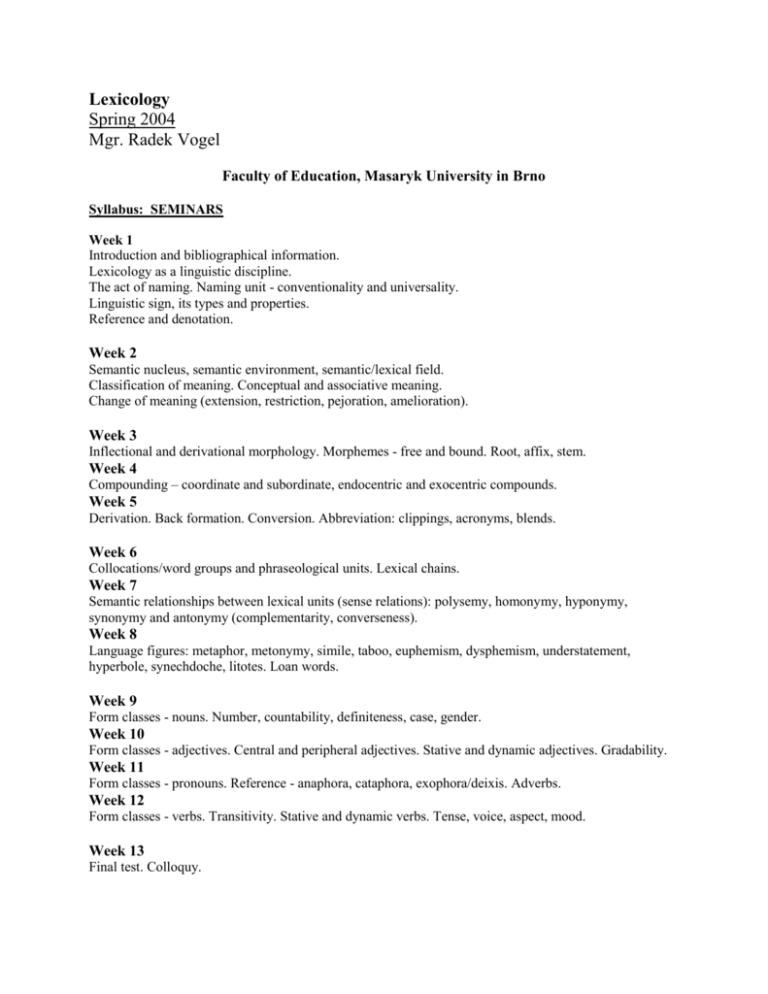
Lexicology Spring 2004 Mgr. Radek Vogel Faculty of Education, Masaryk University in Brno Syllabus: SEMINARS Week 1 Introduction and bibliographical information. Lexicology as a linguistic discipline. The act of naming. Naming unit - conventionality and universality. Linguistic sign, its types and properties. Reference and denotation. Week 2 Semantic nucleus, semantic environment, semantic/lexical field. Classification of meaning. Conceptual and associative meaning. Change of meaning (extension, restriction, pejoration, amelioration). Week 3 Inflectional and derivational morphology. Morphemes - free and bound. Root, affix, stem. Week 4 Compounding – coordinate and subordinate, endocentric and exocentric compounds. Week 5 Derivation. Back formation. Conversion. Abbreviation: clippings, acronyms, blends. Week 6 Collocations/word groups and phraseological units. Lexical chains. Week 7 Semantic relationships between lexical units (sense relations): polysemy, homonymy, hyponymy, synonymy and antonymy (complementarity, converseness). Week 8 Language figures: metaphor, metonymy, simile, taboo, euphemism, dysphemism, understatement, hyperbole, synechdoche, litotes. Loan words. Week 9 Form classes - nouns. Number, countability, definiteness, case, gender. Week 10 Form classes - adjectives. Central and peripheral adjectives. Stative and dynamic adjectives. Gradability. Week 11 Form classes - pronouns. Reference - anaphora, cataphora, exophora/deixis. Adverbs. Week 12 Form classes - verbs. Transitivity. Stative and dynamic verbs. Tense, voice, aspect, mood. Week 13 Final test. Colloquy. Lexicology - Spring 2004 - topics: Lexicology as a linguistic discipline. The functional analysis of a language. Vocabulary, lexicon, lexeme, word. The act of naming. Naming unit - conventionality and universality. Linguistic sign, its types and properties. Reference and denotation. Semantic nucleus, semantic environment, semantic/lexical field. Classification of meaning. Conceptual and associative meaning. Change of meaning (extension, restriction, pejoration, amelioration). The classification of naming units - word/form classes. Open and closed sets. Motivated and nonmotivated words. Inflectional and derivational morphology. Morphemes - free and bound. Root, affix, stem. Compounding – coordinate and subordinate, endocentric and exocentric compounds. Derivation. Back formation. Conversion. Abbreviation: clippings, acronyms, blends. Collocations/word groups and phraseological units. Lexical chains. Diachronic and synchronic approach to the study of the wordstock. The comparative vs. contrastive method. The origin and development of the English wordstock. Word formation processes: derivation, compounding, back formation. Foreign naming units. Semantic relationships between lexical units: polysemy, homonymy, paronymy, hyponymy, synonymy and antonymy (complementarity, converseness). Semantic and stylistic neologisms. Metaphor, metonymy. Simile, taboo, euphemism, dysphemism, understatement, hyperbole, synechdoche, litotes. The stratification of the English wordstock. Standard English, geographical dialects and sociolects. Centre and periphery in the lexis of a language. Language varieties. Stylistic differentiation of the lexicon. Functional styles. Lexical cohesion and coherence of a text. Lexical chains. Form classes - nouns. Number, countability, definiteness, case, gender. Form classes - adjectives. Central and peripheral adjectives. Stative and dynamic adjectives. Gradability. Form classes - pronouns. Reference - anaphora, cataphora, exophora/deixis. Form classes - verbs. Transitivity. Stative and dynamic verbs. Tense, voice, aspect, mood. Lexicography. Types of dictionaries. The structure of dictionary entries. Corpus. Lexicology – Spring 2004 Bibliography: Hladký, Josef – Růžička, Milan: A Functional Onomatology of English. Masarykova univerzita, Brno 1998. Vachek, Josef: A Linguistic Characterology of Modern English. (3. přeprac. vydání – Clare Krojzlová a Josef Hladký). Státní pedagogické nakladatelství, Praha 1990. Vachek, Josef: Chapters from Modern English Lexicology and Stylistics. SPN, Praha/Bratislava 1974. Palmer, Frank Robert: Semantics. (2nd edition). Cambridge University Press, first published 1976. Hasan, Rugaiya-Halliday, M.A.K.: Language, context and text: Aspects of language in a socialsemiotic perspective. 2nd edition. Oxford University Press 1990. Adams, Valerie: An introduction to modern English word-formation. Longman, London 1973. English language series, no. 7. Radford, A. - Atkinson, M. – Britain, D. – Clahsen, H. – Spencer, A.: Linguistics. An Introduction. Cambridge University Press 1999. Mathesius, Vilém: A Functional Analysis of Present Day English on a General Linguistic Basis. Transl. by Libuše Dušková. Academia, Praha 1975. Crystal, David: The Cambridge Encyclopedia of the English Language. Cambridge University Press 1995. Čermák, František: Jazyk a jazykověda. Nakladatelství Karolinum, Praha 2001. Čermák, F. - Blatná, R. a kol.: Manuál lexikografie. Nakladatelství H&H, 1995. Peprník, J.: English Lexicology. UP, Olomouc. Cruse, D.A.: Lexical Semantics. Cambridge University Press 1986, 1991. Halliday, M.A.K.: Language as social semiotic. Edward Arnold 1978. Bolinger, Dwight - Sears, Donald A.: Aspects of Language. Third Edition. Harcourt Brace Jovanovich College Publishers 1968, 1981.
